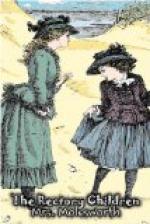LIST OF ILLUSTRATIONS
&nb
sp; Page
’——and—oh,
Alie, I have so torn my frock, and it’s my
afternoon one—my new merino’
27
‘Little girl,’ she called,
when she got close to the
other child
75
‘It’s like a magic-lantern; no, I mean a peep-show’ 89
‘I would like to go there,’ she said 115
A secret 148
——carrying between
them a little dripping figure, with
streaming hair, white face, and closed eyes
161
‘Now, Biddy. Open your eyes’ 195
’O little hearts! that
throb and beat,
With such impatient, feverish heat,
Such limitless and strong desires.’—Longfellow.
THE RECTORY CHILDREN
CHAPTER I
THE PARLOUR BEHIND THE SHOP
‘I was very solitary
indeed.’
(Visit to the Cousins).—Mary
Lamb.
The blinds had been drawn down for some time in the back parlour behind Mr. Fairchild’s shop in Pier Street, the principal street in the little town of Seacove. And the gas was lighted, though it was not turned up very high. It was a great thing to have gas; it had not been known at Seacove till recently. For the time of which I am writing is now a good many years ago, thirty or forty at least.
Seacove, though a small place, was not so out-of-the-way in some respects as many actually larger towns, for it was a seaport, though not a very important one. Ships came in from all parts of the globe, and sailed away again in due course to the far north, and still farther off south; to the great other world of America, too, no doubt, and to the ancient eastern lands. But it was the vessels going to or coming from the strange mysterious north—the land of everlasting snow, where the reindeer and, farther north still, the white bear have their home, and where the winter is one long, long night—it was somehow the thought of the north that had the most fascination for the little girl who was sitting alone in the dull parlour behind the shop this late November evening. And among the queer outlandish-looking sailors who from time to time were to be seen on the wharf or about the Seacove streets, now and then looking in to buy a sheet of paper and an envelope in her father’s shop, it was the English ones belonging to the whalers or to the herring smacks bound for the north who interested Celestina by far the most.




